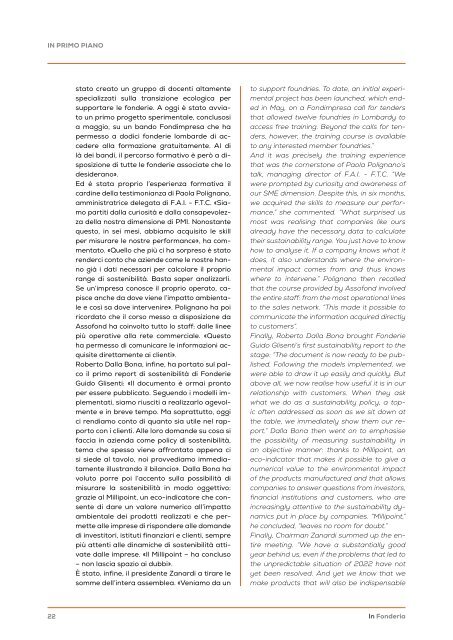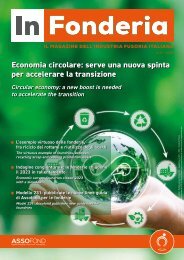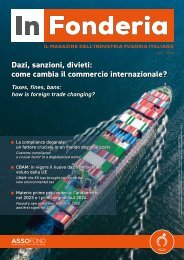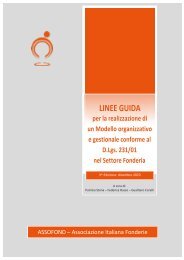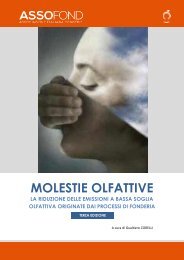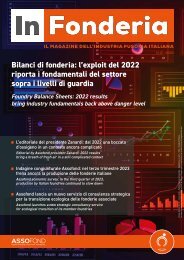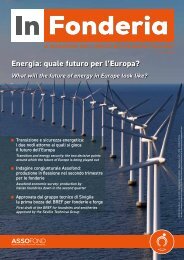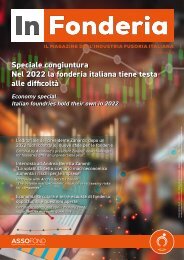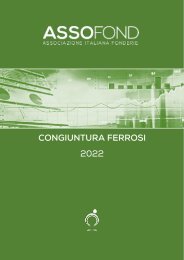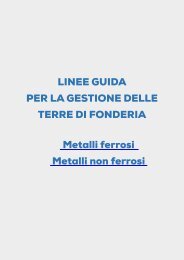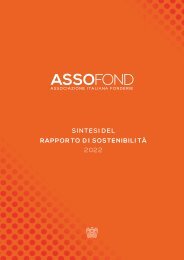In Fonderia 4 2023
Quarto numero del 2023 di In Fonderia
Quarto numero del 2023 di In Fonderia
You also want an ePaper? Increase the reach of your titles
YUMPU automatically turns print PDFs into web optimized ePapers that Google loves.
IN PRIMO PIANO<br />
stato creato un gruppo di docenti altamente<br />
specializzati sulla transizione ecologica per<br />
supportare le fonderie. A oggi è stato avviato<br />
un primo progetto sperimentale, conclusosi<br />
a maggio, su un bando Fondimpresa che ha<br />
permesso a dodici fonderie lombarde di accedere<br />
alla formazione gratuitamente. Al di<br />
là dei bandi, il percorso formativo è però a disposizione<br />
di tutte le fonderie associate che lo<br />
desiderano».<br />
Ed è stata proprio l’esperienza formativa il<br />
cardine della testimonianza di Paola Polignano,<br />
amministratrice delegata di F.A.I. - F.T.C. «Siamo<br />
partiti dalla curiosità e dalla consapevolezza<br />
della nostra dimensione di PMI. Nonostante<br />
questo, in sei mesi, abbiamo acquisito le skill<br />
per misurare le nostre performance», ha commentato.<br />
«Quello che più ci ha sorpreso è stato<br />
renderci conto che aziende come le nostre hanno<br />
già i dati necessari per calcolare il proprio<br />
range di sostenibilità. Basta saper analizzarli.<br />
Se un’impresa conosce il proprio operato, capisce<br />
anche da dove viene l’impatto ambientale<br />
e così sa dove intervenire». Polignano ha poi<br />
ricordato che il corso messo a disposizione da<br />
Assofond ha coinvolto tutto lo staff: dalle linee<br />
più operative alla rete commerciale. «Questo<br />
ha permesso di comunicare le informazioni acquisite<br />
direttamente ai clienti».<br />
Roberto Dalla Bona, infine, ha portato sul palco<br />
il primo report di sostenibilità di Fonderie<br />
Guido Glisenti: «Il documento è ormai pronto<br />
per essere pubblicato. Seguendo i modelli implementati,<br />
siamo riusciti a realizzarlo agevolmente<br />
e in breve tempo. Ma soprattutto, oggi<br />
ci rendiamo conto di quanto sia utile nel rapporto<br />
con i clienti. Alle loro domande su cosa si<br />
faccia in azienda come policy di sostenibilità,<br />
tema che spesso viene affrontato appena ci<br />
si siede al tavolo, noi provvediamo immediatamente<br />
illustrando il bilancio». Dalla Bona ha<br />
voluto porre poi l’accento sulla possibilità di<br />
misurare la sostenibilità in modo oggettivo:<br />
grazie al Millipoint, un eco-indicatore che consente<br />
di dare un valore numerico all’impatto<br />
ambientale dei prodotti realizzati e che permette<br />
alle imprese di rispondere alle domande<br />
di investitori, istituti finanziari e clienti, sempre<br />
più attenti alle dinamiche di sostenibilità attivate<br />
dalle imprese. «Il Millipoint – ha concluso<br />
– non lascia spazio ai dubbi».<br />
È stato, infine, il presidente Zanardi a tirare le<br />
somme dell’intera assemblea. «Veniamo da un<br />
to support foundries. To date, an initial experimental<br />
project has been launched, which ended<br />
in May, on a Fondimpresa call for tenders<br />
that allowed twelve foundries in Lombardy to<br />
access free training. Beyond the calls for tenders,<br />
however, the training course is available<br />
to any interested member foundries.”<br />
And it was precisely the training experience<br />
that was the cornerstone of Paola Polignano’s<br />
talk, managing director of F.A.I. - F.T.C. “We<br />
were prompted by curiosity and awareness of<br />
our SME dimension. Despite this, in six months,<br />
we acquired the skills to measure our performance,”<br />
she commented. “What surprised us<br />
most was realising that companies like ours<br />
already have the necessary data to calculate<br />
their sustainability range. You just have to know<br />
how to analyse it. If a company knows what it<br />
does, it also understands where the environmental<br />
impact comes from and thus knows<br />
where to intervene.” Polignano then recalled<br />
that the course provided by Assofond involved<br />
the entire staff: from the most operational lines<br />
to the sales network. “This made it possible to<br />
communicate the information acquired directly<br />
to customers”.<br />
Finally, Roberto Dalla Bona brought Fonderie<br />
Guido Glisenti’s first sustainability report to the<br />
stage: “The document is now ready to be published.<br />
Following the models implemented, we<br />
were able to draw it up easily and quickly. But<br />
above all, we now realise how useful it is in our<br />
relationship with customers. When they ask<br />
what we do as a sustainability policy, a topic<br />
often addressed as soon as we sit down at<br />
the table, we immediately show them our report.”<br />
Dalla Bona then went on to emphasise<br />
the possibility of measuring sustainability in<br />
an objective manner: thanks to Millipoint, an<br />
eco-indicator that makes it possible to give a<br />
numerical value to the environmental impact<br />
of the products manufactured and that allows<br />
companies to answer questions from investors,<br />
financial institutions and customers, who are<br />
increasingly attentive to the sustainability dynamics<br />
put in place by companies. “Millipoint,”<br />
he concluded, “leaves no room for doubt.”<br />
Finally, Chairman Zanardi summed up the entire<br />
meeting. “We have a substantially good<br />
year behind us, even if the problems that led to<br />
the unpredictable situation of 2022 have not<br />
yet been resolved. And yet we know that we<br />
make products that will also be indispensable<br />
22<br />
<strong>In</strong> <strong>Fonderia</strong>


